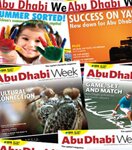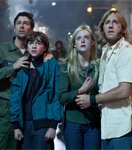The UAE’s first professional rally driver Khaled Al Qassimi is setting an example for up-and-coming Emirati motorsport hopefuls

It’s been a while since 1993 when Khaled Al Qassimi first climbed behind the wheel and took off on his career as a professional rally car driver. After several successful years with the Middle East Rally Championship (MERC) and the Production Car World Rally Championships (PWRC), he stepped up to the big time with his entry into the Ford Abu Dhabi World Rally Team in 2007. Since then, he’s been making a name for himself as someone who’s not afraid to take a risk.
“I like the thrill because sometimes I need to wake myself up,” says the 39-year-old Emirati. “I like the extreme because when the adrenaline is pumping, the fear drops and you try to go flat out and faster. To do the extreme times, you have to go a little bit crazy.”
Though he likes going nuts on the race course, Khaled is anything but reckless. In fact, he’s the face of the Health Authority – Abu Dhabi’s road safety campaign (www.roadsafety.ae).
“I didn’t jump into a rally car from the first day I learned to drive a car – it took me a long time to learn to respect the road. Too many young boys in the UAE lose their lives in the UAE from driving too fast and I’d like to see that stop.”
While it’s his job these days, Khaled knows exactly what the consequences of driving too fast can be – on the race course, anyway.
“To come back after an accident is not easy. Last year I had a couple of big rolls in Japan and Finland, and I went off the road in Portugal – I didn’t roll but it was a massive impact. In Japan I had a couple of bruises, and I still have hip problems from Finland. I’ve had to have cortisone injections in my hip and I may need to have knee surgery by the end of the year. Probably the worst injury was in Dubai in 2003 when I broke my D12 vertebra.”
In spite of the accidents, he’s had plenty of victories as well.
“In Acropolis, I finished sixth among some of the best drivers in the world – I won a lot of points for the championship with that race but my best ever victory was winning my home event, the last round of the MERC in Dubai.”
Though race weekends are chock-a-block, Khaled has plenty to do when he’s at home in Abu Dhabi.
9am: Without the pressure of competition, Khaled is free to sleep a little later than he would on race day. Though his next race isn’t for another few weeks, Khaled will spend some of his time at home preparing long distance with his co-driver Michael Orr.
“Michael and I work together to research the next place we will go for a race. I like to see what each race site is like so I know what sort of clothing I need to bring and also to gather information about the stage. Michael and I like to plan what will happen and what we’re going to do. Even though he’s in Ireland and I’m here, we’re still communicating by email and phone.”
11am: Khaled’s not eager to get out of the house and for good reason – recently married, he is a self described homebody.
“This sport keeps me away from my family because I’m travelling all the time and it’s easy for me to lose touch with my friends. After every event I used to feel lonely, but now I know I have at least one person at home waiting to see me. Getting married was the best decision I ever made. My wife is very clever but she’s also there for me.”
2pm: After a light lunch, Khaled takes some time to touch base with the rising stars of the UAE’s rally racing scene who are involved with the Abu Dhabi Tourism Authority’s Junior Driver Development Programme.
“The junior driver programme was formed to encourage the sport in the United Arab Emirates. Our European counterparts start driving with their fathers when they’re 12 years old, but motor sports are new to us, so we need to educate the next generation.”
4pm: Though some might argue race car driving isn’t a physical sport, Khaled knows he performs best behind the wheel when he’s in good condition. “I used to jog or bike to build my endurance but since I injured my knee I don’t do that anymore. Instead I do stretching and weights. Race car driving is quite physical, for sure. I used to weight 22 kilograms more than I do now.”
8pm: It’s time for an early dinner and an evening watching movies and spending time with his family then tomorrow he’s back in the car – but not to race.
“I live between Abu Dhabi (where I’m from) and Dubai and Sharjah. All my family is in Abu Dhabi but I spend the weekends with friends in Dubai and Sharjah. My wife’s family is there so we go there so she can spend time with her family and I can be with my friends.”
Final thoughts: Despite the hazards of the sport and the time spent away from friends and family, anyone who speaks to Khaled khnows he is thrilled to be racing at a world class level.
“Never has an Emirati reached this level, so I’m trying to be an ambassador for this sport and an icon for the youth of the UAE. I’m passionate about what I’m doing.”
Laura Fulton





